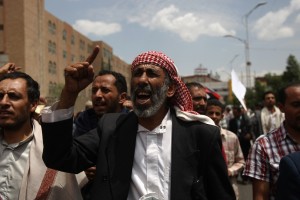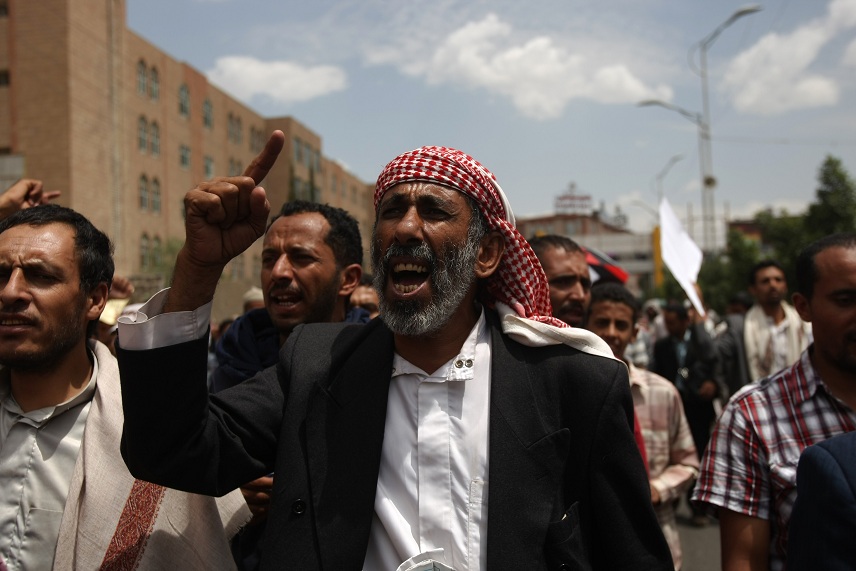
(AFP FILE PHOTO/MOHAMMED HUWAIS)
Nearly a month has passed since Saudi Arabia launched its first airstrike in the southern Yemeni town of Aden against Shi’a Al-Houthi rebels, turning Yemen into a no-fly zone. This has left many of Yemeni civilians abroad stuck between the struggle of returning home and affording the expenses of their lives abroad.
Despite their different views towards the airstrikes, Yemeni civilians in Egypt share a common struggle, demanding only to return to their homeland despite the unrest. Daily News Egypt spoke to a group of them.
Wearing his traditional Yemeni turban and attire, Abdrabbou A, a senior citizen from Marib, was sitting on the sidewalk in front of the Yemeni embassy in Cairo with a group of other Yemeni men. They were holding their passports and their copies of tickets seeking the embassy’s help to return to Yemen.
“I came here for treatment over a month ago, if I knew what was going to happen I would have preferred to die there instead of coming,” he said.
According to Abdrabbou, life in Egypt is very expensive. He added: “Everything here is expensive, I ran out of cash, food and water, spent a lot of money on the treatment.”
Abdrabbou is living with three other Yemeni families who are also stuck in Egypt. He said: “We are three families living in one apartment, sharing one bathroom, it’s a struggle for all of us.”
Speaking to a group of civilians in front of the embassy, some have been staying in Egypt for a longer time, others arrived just before the airstrike. The majority were coming to Egypt for treatment.
The airstrikes not only turned Yemen into a no-fly zone, but also all money transferrals were cancelled to and from Yemen. Moreover, no ships are allowed to cross through Saudi or Omani waters.
“Regardless of anything, the Yemeni ambassador is the official representative here of our country,” Abdrabbou said. “We demand from him, President Abdel Fattah Al-Sisi, and Saudi Arabia to open its border so we can go back to Yemen, or afford our expenses of living here.”
Unlike some of the civilians in Egypt who view the airstrikes as the main reason for their current status, other Yemenis from the southern part of the country explicitly support the airstrikes. They believe it would release the south from the alleged northern occupation. Nevertheless, both parties are still demanding their return to their homeland.
Antar A, a citizen from Hadhramaut, said: “We have been stuck here in front of the embassy for over 15 days without a solution.”
He added: “The embassy abandoned us, and the support they’re supposed to give us.”
According to Antar, some people volunteered to help them who he described as “people of good deeds”. He said: “We depend on Allah and ourselves, living here is so, so hard, but there are real endeavours from many people to help us.”
Despite the risk imposed on many civilians living there and or returning to Yemen, they all said they are not afraid to go back and die among their families.
A few others, however, have managed to afford a living in Egypt after becoming stuck. As soon as Mohamed G, a Yemeni journalist, who was passing through Cairo in transit for his trip back from Jordan to Yemen, the first airstrike was launched. He has found himself staying in an apartment with two others.
He said: “I believe the Yemeni embassy has not enough budget to give apartments to all the people here, and they cannot send them back; there is no flights allowed.”
“I might be living here in an apartment with only two of my countrymen, but there are many poor civilians who are suffering and facing worse conditions,” he added.
Back at the embassy, where many women, children and men are sitting waiting for the moment they can fly home, a citizen who has been in Egypt for two months for treatment said: “Our country is on the verge of collapsing, and I am not really expecting anything from the embassy.”

